Filter by
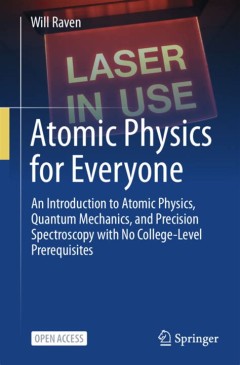
Atomic Physics for Everyone = An Introduction to Atomic Physics, Quantum Mech…
This open access textbook introduces beginning undergraduate students and high school students to the world of quantum mechanics and atomic spectroscopy. Requiring no previous knowledge of physics and no math beyond basic algebra and sines and cosines, this book focuses on concepts to make the excitement of atomic physics more accessible for learners than ever before. It comes replete with lea…
- Edition
- 1
- ISBN/ISSN
- 9783031695070
- Collation
- XIII, 263 hlm; ill., lamp.,
- Series Title
- -
- Call Number
- -

Spectra and Dynamics of Small Molecules: Alexander von Humboldt Lectures
These seven lectures are intended to serve as an introduction for beginning graduate students to the spectra of small molecules. The author succeeds in illustrating the concepts by using language and metaphors that capture and elegantly convey simple insights into dynamics that lie beyond archival molecular constants. The lectures can simultaneously be viewed as a collection of interlocking spe…
- Edition
- -
- ISBN/ISSN
- 978-3-319-15958-4
- Collation
- -
- Series Title
- -
- Call Number
- -

Branes and DAHA Representations
In recent years, there has been an increased interest in exploring the connections between various disciplines of mathematics and theoretical physics such as representation theory, algebraic geometry, quantum field theory, and string theory. One of the challenges of modern mathematical physics is to understand rigorously the idea of quantization. The program of quantization by branes, which com…
- Edition
- -
- ISBN/ISSN
- 978-3-031-28153-2
- Collation
- VI, 143
- Series Title
- -
- Call Number
- -

Enrico Fermi the Obedient Genius
This biography explores the life and career of the Italian physicist Enrico Fermi, which is also the story of thirty years that transformed physics and forever changed our understanding of matter and the universe: nuclear physics and elementary particle physics were born, nuclear fission was discovered, the Manhattan Project was developed, the atomic bombs were dropped, and the era of “big sc…
- Edition
- -
- ISBN/ISSN
- 978-1-4939-3533-8
- Collation
- 51 b/w illustrations, 3 illustrations in colour
- Series Title
- -
- Call Number
- -
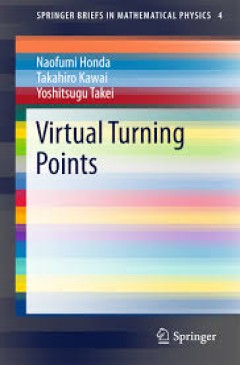
Virtual Turning Points
The discovery of a virtual turning point truly is a breakthrough in WKB analysis of higher order differential equations. This monograph expounds the core part of its theory together with its application to the analysis of higher order Painlevé equations of the Noumi–Yamada type and to the analysis of non-adiabatic transition probability problems in three levels. As M.V. Fedoryuk once lame…
- Edition
- -
- ISBN/ISSN
- 978-4-431-55702-9
- Collation
- -
- Series Title
- -
- Call Number
- -
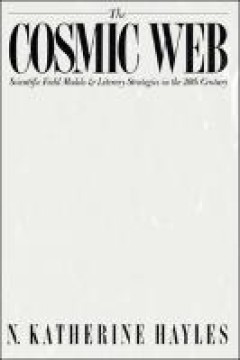
The Cosmic Web: Scientific Field Models and Literary Strategies in the Twenti…
From the central concept of the field—which depicts the world as a mutually interactive whole, with each part connected to every other part by an underlying field— have come models as diverse as quantum mathematics and Saussure’s theory of language. In The Cosmic Web, N. Katherine Hayles seeks to establish the scope of the field concept and to assess its importance for contemporary though…
- Edition
- Ed. 1
- ISBN/ISSN
- 9781501722974, 9781501727931
- Collation
- 210
- Series Title
- -
- Call Number
- 530.143 HAY c
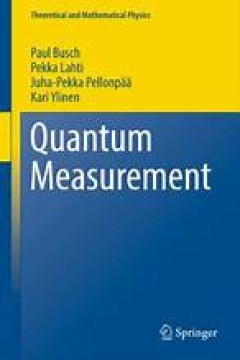
Quantum Measurement
This is a book about the Hilbert space formulation of quantum mechanics and its measurement theory. It contains a synopsis of what became of the Mathematical Foundations of Quantum Mechanics since von Neumann’s classic treatise with this title. Fundamental non-classical features of quantum mechanics—indeterminacy and incompatibility of observables, unavoidable measurement disturbance, entan…
- Edition
- 1
- ISBN/ISSN
- 978-3-319-43389-9
- Collation
- Mathematical
- Series Title
- Theoretical and Mathematical Physics
- Call Number
- 510
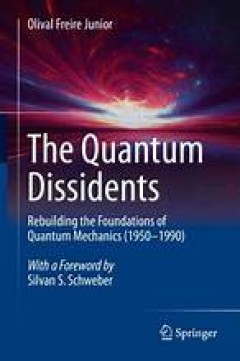
The Quantum Dissidents
This book tells the fascinating story of the people and events behind the turbulent changes in attitudes to quantum theory in the second half of the 20th century. The huge success of quantum mechanics as a predictive theory has been accompanied, from the very beginning, by doubts and controversy about its foundations and interpretation. This book looks in detail at how research on foundations e…
- Edition
- 1
- ISBN/ISSN
- 978-3-662-44662-1
- Collation
- Fisika
- Series Title
- -
- Call Number
- 530
Relativistic Quantum Mechanics
This book describes a relativistic quantum theory developed by the author starting from the E.C.G. Stueckelberg approach proposed in the early 40s. In this framework a universal invariant evolution parameter (corresponding to the time originally postulated by Newton) is introduced to describe dynamical evolution. This theory is able to provide solutions for some of the fundamental problems enco…
- Edition
- -
- ISBN/ISSN
- -
- Collation
- -
- Series Title
- -
- Call Number
- -
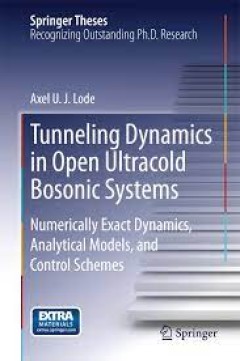
Tunneling Dynamics in Open Ultracold Bosonic Systems Numerically Exact Dynam…
This thesis addresses the intriguing topic of the quantum tunnelling of many-body systems such as Bose-Einstein condensates. Despite the enormous amount of work on the tunneling of a single particle through a barrier, we know very little about how a system made of several or of many particles tunnels through a barrier to open space. The present work uses numerically exact solutions of the time-…
- Edition
- -
- ISBN/ISSN
- 978-3-319-07085-8
- Collation
- -
- Series Title
- -
- Call Number
- -
 Computer Science, Information & General Works
Computer Science, Information & General Works  Philosophy & Psychology
Philosophy & Psychology  Religion
Religion  Social Sciences
Social Sciences  Language
Language  Pure Science
Pure Science  Applied Sciences
Applied Sciences  Art & Recreation
Art & Recreation  Literature
Literature  History & Geography
History & Geography